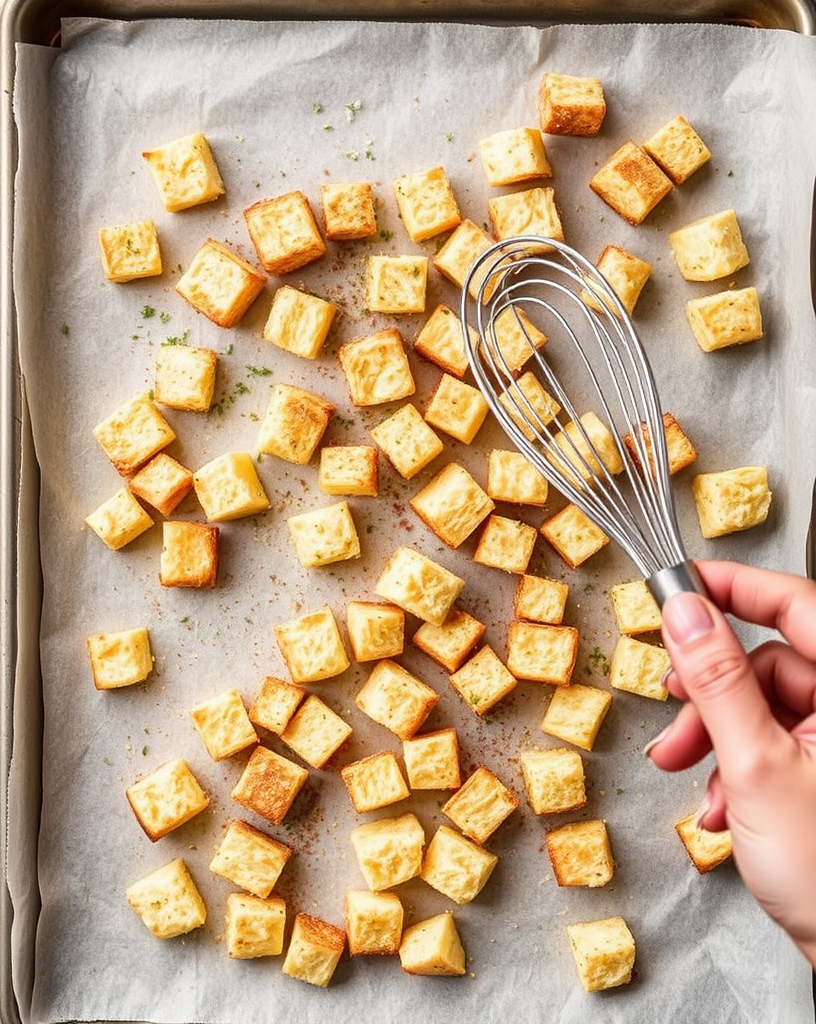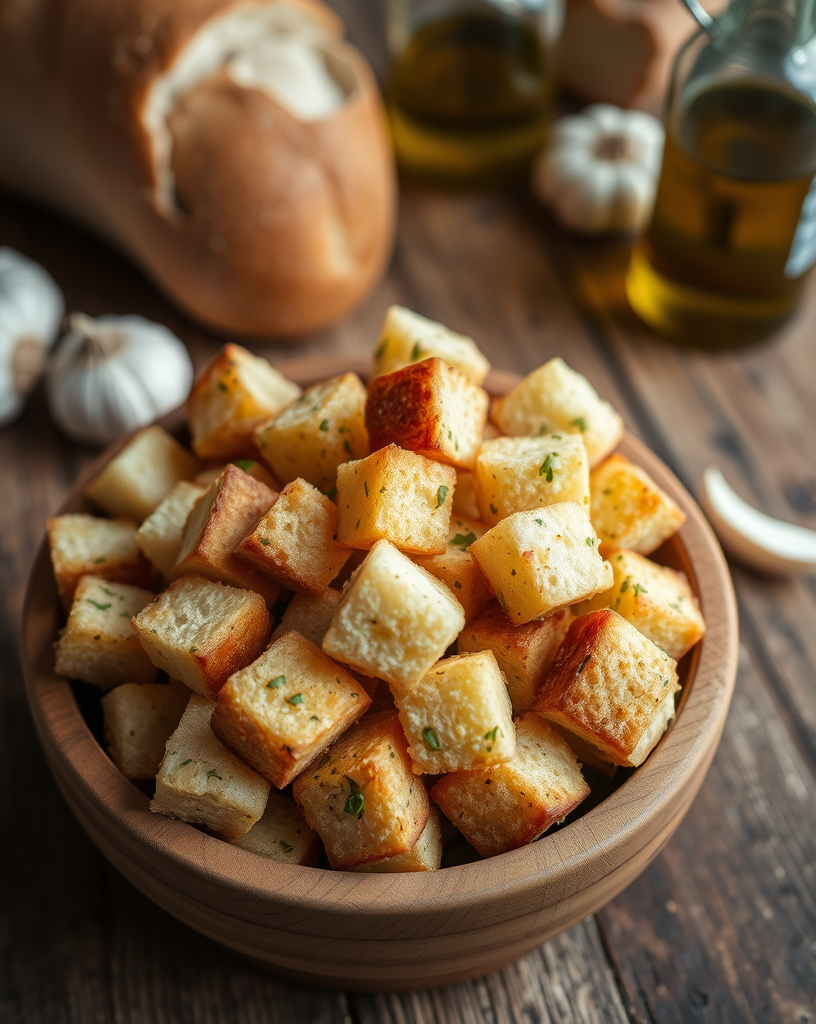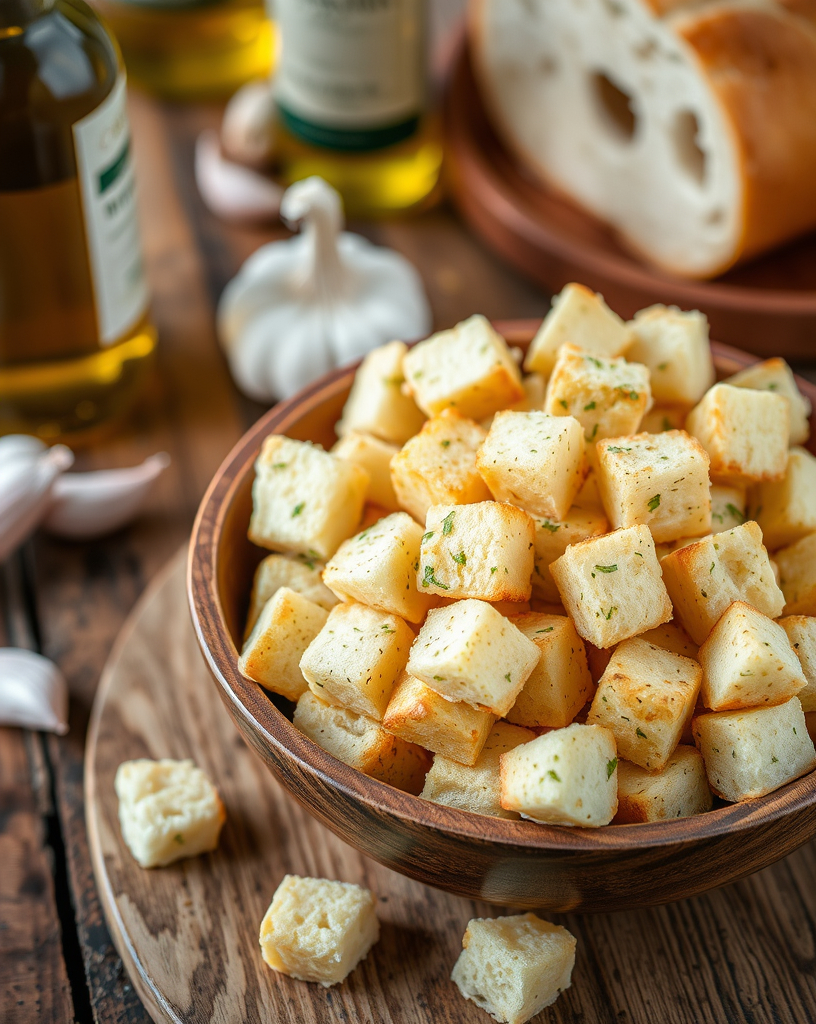Table of Contents
ToggleCan Vegans Eat Croutons? An In-Depth Guide
What Are Croutons?
Croutons are small, crispy pieces of bread that are typically toasted or fried. They are often used to enhance the flavor and texture of dishes, such as salads and soups. Known for their versatility, croutons can be made from various types of bread and are frequently seasoned for added taste. But can vegans eat croutons? This question arises due to the variety of ingredients that may be used.
Ingredients Commonly Found in Croutons
Croutons are simple to make and usually contain a few basic ingredients. These include:
- Bread: The base ingredient, which can vary from white and whole-grain to more specialty options like sourdough or rye.
- Oil or Butter: These are used to coat the bread pieces, giving them their signature crispness.
- Seasonings: Common additions include garlic, herbs, salt, and sometimes cheese for an extra burst of flavor.
Some ingredients, like butter or cheese, may make certain croutons unsuitable for vegans. This highlights the importance of asking, can vegans eat croutons?, before adding them to your meal.
Types of Croutons Available in the Market
Croutons come in several varieties, catering to different preferences and dietary needs:
- Plain Croutons
- These are unflavored or lightly salted, emphasizing the natural taste of the bread.
- They are a great choice for dishes that already have strong flavors.
- Seasoned Croutons
- These are flavored with ingredients like garlic, Italian herbs, or parmesan cheese.
- However, some seasoned croutons may not be vegan-friendly, making it crucial to check the ingredients.
- Specialty Croutons
- Made for specific diets, these include gluten-free, organic, or vegan options.
- Specialty croutons are ideal for those asking, can vegans eat croutons?, as they often cater to plant-based lifestyles.
With their wide variety of flavors and textures, croutons are a beloved addition to many meals, but checking their ingredients is essential for ensuring they align with your dietary needs.
Veganism and Food Ingredients: What to Watch Out For
Understanding food ingredients is crucial for vegans, as many products contain hidden animal-derived components. Croutons, for example, may seem plant-based but can include ingredients that make them unsuitable for a vegan diet. Here’s what to watch out for.
Hidden Animal-Derived Ingredients in Everyday Foods
Many everyday foods contain animal-based ingredients that aren’t always obvious. Some common culprits include:
- Dairy Products: Ingredients like butter, cheese, or milk powder are often added to croutons for flavor.
- Animal-Derived Enzymes: Certain breads used to make croutons may contain enzymes derived from animals.
- Flavor Enhancers: Additives like whey powder or casein, both derived from milk, are frequently used to boost flavor.
- Animal-Based Seasonings: Some croutons may include seasonings like anchovy paste or chicken stock, making them unsuitable for vegans.
These hidden ingredients highlight the importance of carefully reviewing labels to ensure a product aligns with vegan principles.
Why Reading Labels Matters for Vegans
Reading labels is an essential skill for vegans. Unfortunately, food labeling can often be confusing or misleading, which adds to the challenge. Here are a few reasons why vegans need to pay extra attention:
- Misleading Ingredients: Terms like “natural flavors” or “enzymes” can conceal animal-derived components. For instance, natural flavors might come from meat or dairy sources.
- Lack of Transparency: Some labels list ingredients in a way that makes it unclear if they are plant- or animal-based.
- Certified Vegan Labels: The easiest way to confirm a product’s vegan status is to look for certified vegan labels. These certifications guarantee the product meets vegan standards.
By understanding these challenges and solutions, vegans can make informed choices and avoid hidden animal-derived ingredients in their food.
Are Croutons Typically Vegan?
The question can vegans eat croutons? depends largely on how they are made. Many traditional recipes and store-bought options include non-vegan ingredients, making it essential for vegans to carefully assess their choices.
Traditional Recipes for Croutons
Homemade croutons are often not vegan due to the ingredients used. Here are some common reasons why:
- Butter and Cheese: Traditional recipes often include butter for crisping or cheese for added flavor, both of which are not vegan-friendly.
- Egg-Based Bread: Some recipes use bread that contains eggs, which further disqualifies them from being vegan.
However, with a few substitutions—like olive oil instead of butter and vegan-certified bread—homemade croutons can easily become vegan-friendly.
Store-Bought Croutons: Vegan-Friendly Options
Store-bought croutons require careful scrutiny as many of them contain animal-derived ingredients:
- Dairy-Based Seasonings: Common additives like parmesan cheese, milk powder, or butter are frequently used to flavor croutons.
- Hidden Animal Ingredients: Certain brands use whey, casein, or other dairy derivatives that are not always obvious at first glance.
Despite these challenges, vegan-friendly croutons are available. Look for brands that specifically label their products as vegan or plant-based. Always check the ingredient list for clarity and avoid products with ambiguous terms like “natural flavors,” which might contain animal-derived components.
By understanding the ingredients in both traditional and store-bought croutons, vegans can find or create options that fit their lifestyle. Whether making your own or seeking out vegan-certified brands, it’s entirely possible to enjoy croutons while adhering to a plant-based diet.
How to Identify Vegan Croutons
Identifying vegan croutons can be simple if you know what to look for. Whether you’re shopping at the store or dining out, paying attention to labeling and asking the right questions can help ensure your croutons align with your plant-based lifestyle.
Labeling and Certification: What to Look For
When buying croutons, the packaging provides valuable information about whether they are vegan. Here’s what to check:
- Vegan Certification Logos: Look for labels such as “Certified Vegan” or “Plant-Based.” These logos confirm the product is free from animal-derived ingredients and meets vegan standards.
- Ingredient List: Avoid products that include dairy, eggs, or animal-based seasonings like butter or cheese.
- Ambiguous Terms: Be cautious of terms like “natural flavors” or “enzymes,” which could potentially include animal-derived components. If unclear, reach out to the manufacturer for clarification.
By thoroughly examining the packaging, you can confidently choose croutons that fit your vegan diet.
Tips for Asking Questions in Restaurants
When dining out, determining if croutons are vegan can require a bit more effort. Here’s how to ensure your meal stays plant-based:
- Ask About Ingredients: Politely inquire whether the croutons are made with butter, cheese, or other animal-based seasonings.
- Check Preparation Methods: Confirm how the croutons are cooked. Ask if they share equipment or oil with non-vegan ingredients, as cross-contamination can be an issue for strict vegans.
- Request Modifications: If the croutons are not vegan, ask if the dish can be served without them or replaced with a vegan-friendly alternative.
Most restaurant staff are happy to accommodate dietary preferences and provide details about the ingredients they use.
By understanding labels and confidently asking questions, you can easily identify vegan croutons and enjoy them without compromising your dietary values.
How to Identify Vegan Croutons: Can Vegans Eat Croutons?
Identifying vegan croutons can be simple if you know what to look for. Whether you’re shopping at the store or dining out, paying attention to labeling and asking the right questions can help ensure your croutons align with your plant-based lifestyle. So, can vegans eat croutons? Yes, but it depends on how they are made.
Labeling and Certification: What to Look For
When buying croutons, the packaging provides valuable information about whether they are vegan. Here’s what to check:
- Vegan Certification Logos: Look for labels such as “Certified Vegan” or “Plant-Based.” These logos confirm the product is free from animal-derived ingredients and meets vegan standards.
- Ingredient List: Avoid products that include dairy, eggs, or animal-based seasonings like butter or cheese.
- Ambiguous Terms: Be cautious of terms like “natural flavors” or “enzymes,” which could potentially include animal-derived components. If unclear, reach out to the manufacturer for clarification.
By thoroughly examining the packaging, you can confidently choose croutons that fit your vegan diet and answer the question, can vegans eat croutons?, with certainty.
Tips for Asking Questions in Restaurants
When dining out, determining if croutons are vegan can require a bit more effort. Here’s how to ensure your meal stays plant-based:
- Ask About Ingredients: Politely inquire whether the croutons are made with butter, cheese, or other animal-based seasonings.
- Check Preparation Methods: Confirm how the croutons are cooked. Ask if they share equipment or oil with non-vegan ingredients, as cross-contamination can be an issue for strict vegans.
- Request Modifications: If the croutons are not vegan, ask if the dish can be served without them or replaced with a vegan-friendly alternative.
Most restaurant staff are happy to accommodate dietary preferences and provide details about the ingredients they use.
By understanding labels and confidently asking questions, you can easily identify vegan croutons and enjoy them without compromising your dietary values. This ensures that the next time you wonder, can vegans eat croutons?, the answer is a resounding yes—when the right choices are made.
Vegan Crouton Alternatives
If you’re looking for vegan-friendly croutons, you have two great options: making your own at home or purchasing them from reliable brands. Both choices allow you to enjoy the crunch and flavor of croutons without compromising your dietary preferences.
Homemade Vegan Croutons: Easy Recipes

- Choose Vegan Bread: Start with bread that contains no dairy or eggs. Options like sourdough, whole-grain, or plain white bread work well.
- Use Plant-Based Ingredients: Toss bread cubes with olive oil or vegan butter for crispness. Season them with plant-based flavors like garlic powder, nutritional yeast, smoked paprika, or Italian herbs.
- Bake to Perfection: Spread the seasoned bread cubes evenly on a baking tray and bake at 375°F (190°C) for 10–15 minutes, turning them halfway through for an even golden texture.
This method allows you to control the ingredients and seasoning, making it ideal for those with dietary restrictions or specific taste preferences.
Commercially Available Vegan Brands
For a quick and convenient option, you can find vegan croutons from various brands that cater to plant-based diets. Some popular choices include:
- Simple Truth: Available at many grocery stores, these croutons are clearly labeled vegan and come in different flavors.
- 365 by Whole Foods: Known for offering plant-based options, their croutons are a reliable choice.
- Edward & Sons: This brand specializes in vegan products and includes croutons among their offerings.
You can also explore specialty vegan stores or online platforms like Amazon for a wider variety of vegan-friendly croutons. These outlets often provide unique flavors and gluten-free options to suit diverse dietary needs.
Whether you decide to make your own or purchase from trusted brands, vegan croutons are an easy and delicious way to enhance your meals.
Nutritional Value of Vegan Croutons
Vegan croutons not only align with plant-based dietary preferences but also offer certain nutritional benefits when compared to their non-vegan counterparts. By understanding the differences in their profiles and the health advantages they provide, you can make more informed dietary choices.
Comparing Nutritional Profiles: Vegan vs. Non-Vegan Croutons
The nutritional content of croutons varies depending on their ingredients. Here’s how vegan croutons stack up against traditional, non-vegan varieties:
- Lower Saturated Fats: Vegan croutons typically omit butter and cheese, which are common in non-vegan recipes. This makes vegan croutons lower in saturated fats, which are associated with cardiovascular risks.
- No Cholesterol: Unlike non-vegan croutons that may contain cholesterol from animal-based ingredients, vegan croutons are cholesterol-free since they use plant-based oils and bread.
- Fewer Additives: Vegan croutons often avoid artificial flavorings and preservatives found in some non-vegan products, offering a cleaner ingredient list.
Overall, vegan croutons tend to be a healthier option, particularly for those mindful of heart health or cholesterol intake.
Health Benefits of Vegan Croutons
In addition to their lower fat and cholesterol content, vegan croutons offer other notable health benefits:
- Healthier Oils: Many vegan recipes use heart-healthy oils like olive oil or avocado oil instead of butter. These oils are rich in monounsaturated fats, which support good cholesterol levels.
- Higher Fiber Content: Vegan croutons made from whole-grain or multigrain bread provide additional dietary fiber, which promotes digestive health and helps with satiety.
- Added Nutrients: If made from fortified or nutrient-dense bread, vegan croutons can deliver essential vitamins and minerals like iron, B vitamins, and calcium.
By choosing vegan croutons, you can enjoy a crunchy, flavorful topping while supporting a balanced and health-conscious diet. Whether store-bought or homemade, they offer a plant-based alternative that doesn’t compromise on taste or nutrition.
Incorporating Vegan Croutons into Your Diet
Vegan croutons are versatile and add texture and flavor to a variety of dishes. Whether you’re preparing fresh salads or warm soups, these crunchy additions can elevate your meals while keeping them plant-based. Here are some creative ways to enjoy them.
Creative Salad Recipes with Vegan Croutons
Salads are a classic way to use croutons, and vegan croutons pair perfectly with plant-based ingredients. Try these ideas:
- Vegan Caesar Salad
- Toss crisp romaine lettuce with a creamy vegan Caesar dressing.
- Add vegan croutons for crunch and include plant-based protein, such as chickpeas or grilled tofu, for a complete meal.
- Kale and Quinoa Salad
- Mix kale, cooked quinoa, and roasted vegetables like sweet potatoes and bell peppers.
- Sprinkle vegan croutons on top for added texture and flavor.
- Mediterranean-Inspired Salad
- Combine mixed greens, cucumbers, cherry tomatoes, olives, and a lemon-tahini dressing.
- Add vegan croutons seasoned with garlic or oregano to complement the Mediterranean flavors.
These recipes show how vegan croutons can transform a simple salad into a satisfying and flavorful dish.
Vegan Soups and Stews Featuring Croutons
Vegan croutons are also a fantastic topping for soups and stews, adding a crunchy contrast to warm, hearty dishes. Consider these options:
- Vegan Tomato Soup
- Serve a creamy vegan tomato soup and top it with garlic-flavored croutons for an added layer of flavor.
- Sprinkle fresh basil or parsley to complete the dish.
- Potato Leek Soup
- Pair a silky vegan potato leek soup with olive oil-drizzled croutons for a delightful combination of textures.
- Hearty Vegan Stew
- Make a vegetable-rich stew with ingredients like lentils, carrots, and potatoes.
- Add croutons just before serving to soak up the savory broth without losing their crunch.
By incorporating vegan croutons into your meals, you can enjoy their delicious crunch while staying true to your plant-based diet. Whether in salads, soups, or stews, they bring versatility and flavor to any dish.
FAQs About Vegan Croutons
Here are answers to some of the most common questions about vegan croutons to help you make informed choices and enjoy them in your meals.
Are All Store-Bought Croutons Non-Vegan?
No, not all store-bought croutons are non-vegan. While many contain dairy-based seasonings like cheese or butter, some brands specifically offer vegan-friendly croutons. These options use plant-based oils and seasonings, but they are less common, so it’s important to check labels carefully.
Can I Make Croutons Without Oil?
Yes, you can make croutons without using oil. Simply bake bread cubes after lightly misting them with water and tossing them in your favorite seasonings. This method creates a crunchy, flavorful option without added fats.
What Are the Best Bread Types for Vegan Croutons?
The best bread types for vegan croutons include those certified vegan, such as whole-grain, sourdough, or multigrain bread. Ensure the bread does not contain dairy, eggs, or honey by reading the ingredient list carefully.
Do Vegan Croutons Taste Different?
Not necessarily. Vegan croutons can replicate traditional flavors by using plant-based seasonings like garlic powder, smoked paprika, or nutritional yeast. These ingredients mimic the rich, savory taste found in non-vegan croutons.
Can Gluten-Free Croutons Be Vegan Too?
Yes, gluten-free croutons can also be vegan. Many gluten-free breads, such as those made from rice or almond flour, are naturally vegan. Using these as a base ensures your croutons meet both dietary needs.
Where Can I Buy Vegan Croutons Online?
Online stores and platforms like Amazon often carry vegan croutons. Check out Vegan Croutons Recipe: Easy & Delicious for guidance.
By understanding these key details, you can confidently select, make, or purchase vegan croutons that fit your lifestyle and preferences.
Conclusion: Enjoying Croutons as a Vegan
While not all croutons are vegan due to ingredients like butter, cheese, or animal-based seasonings, there are plenty of alternatives and recipes that cater to a vegan lifestyle. This raises the question: Can vegans eat croutons? The answer is yes, with the right choices.
By reading labels, asking thoughtful questions at restaurants, and experimenting with creative recipes, you can find or make croutons that perfectly align with your dietary preferences. Whether you purchase vegan-certified options or craft your own at home, croutons can remain a delightful and versatile addition to your salads, soups, and stews. So, the next time you wonder, can vegans eat croutons?, remember there are delicious ways to enjoy them without compromising your values.

